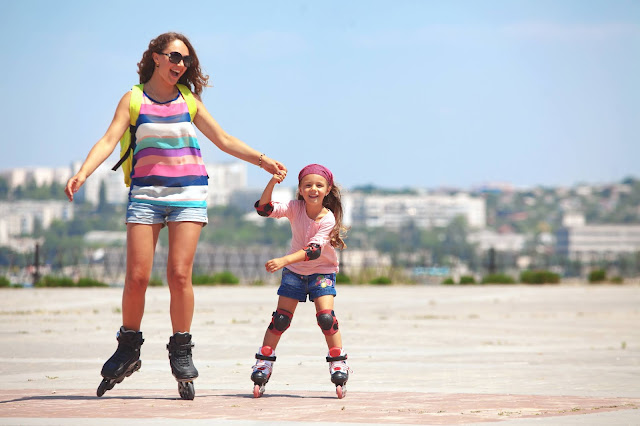Raising and keeping up with extremely active children can be challenging.
They could be unpredictable, switching from one activity to another, looking as if they have unlimited sources of energy, or simply always wanting to do more and find new activities.
It can be frustrating for mums, as they seem to have endless energy making days a long and possibly tiring challenge.
A common characteristic of very active children is that they always crave new sensory experiences, such as jumping, spinning and running fast.
Extremely active kids always look for any activity they could engage in.
This sometimes results in them ignoring you when you need them to be more still or calm and to stop jumping around.
Keeping up with them can be exhausting, but holding them back isn’t the solution either.
The trick is to find new ways to redirect their energy.
Impromptu dance party, anyone?
Naturally energetic or something else?
Children are inherently inquisitive and energetic.
Being super active could just be part of the child’s personality.
However, if your child attends school and lacks the self control that teachers expect in a crowded classroom they may start claiming that they suspect attention deficit hyperactivity disorder (ADHD).
Kids who seem to be incapable of sitting still, have trouble listening to others or even waiting for their turn are most likely just displaying normal kids’ behaviour.
It’s normal for kids to be rowdy sometimes.
Before assuming anything, however, keep in mind that there are crucial differences between a kid who’s just naturally active and a child who has ADHD.
Indeed, it is rare for an unschooled kid to have ADHD as there are less expectations to conform and stay still and quiet outside of a school classroom.
Keeping up with energetic kids can be stressful
A mother’s relationship with her children, for the most part, is contingent on how she manages and deals with stress.
So before anything else, a mother needs to take care of her mental and physical health.
Sounds good in theory, right?
Unfortunately, it’s much more difficult in practice.
Parental stress is no joke, especially now that many children have to stay at home due to the lockdowns.
Stress can manifest in physical symptoms although these symptoms are sometimes misinterpreted and mistaken for something else.
Typically, feeling overwhelmed and raising your voice is just the tip of the iceberg of what you’re feeling inside.
Stress can sneak up on you, so it’s important to recognize these symptoms.
How to deal with stress:
Physical stress-related symptoms like persistent colds, rapid heart rate, dizziness, chest pains, hyperacidity and headaches can show up.
It could even cause any health condition you might already have to flare up.
For example, stress can worsen osteoarthritis symptoms, including other conditions like asthma, migraines and others.
Consequently, some mothers resort to over-the-counter medications like paracetamol to deal with aches and pains, cold symptoms and other stress-related symptoms.
Fortunately, the side effects of paracetamol are relatively mild.
Before you try anything to keep up with your kids, however, make sure to take care of yourself first.
Tips for keeping up with your extremely active kids
Unfortunately, there’s no one-size-fits-all solution on handling or keeping up with overly active kids.
But there are a few tips and suggestions on how to keep up with them, which could help you deal with the kids - and their energy! - positively.
Remember, reining them in isn’t the solution; there are lots of positive ways to redirect their energy.
Here are a few tips to help you keep up with active kids:
1. Do structured activities
A relaxed, laid-back household is less stressful and works for a lot of children.
But if you have kids with energy to last days, they need to have some organised activities to help burn of some energy.
Examples of structured activities that encourage kids to follow instructions are musical chairs, follow the leader, charades or Simon Says.
Grab our printable charades clues here:
If they’re old enough, you can also introduce them to various sports.
Sports have built-in structure, but make sure they play in a safe place.
You could introduce them to football, gymnastics or martial arts and dance lessons.
These are activities that could help them focus and improve their co-ordination.
2. Provide them with new gear or equipment
They might have enjoyed their tricycle, but perhaps it’s time for them to get proper bikes, one with training wheels - or even without.
You could also let them experiment and play with Frisbees (flying discs), Hula-Hoops and various balls or other outdoor toys.
3. Do activities together
You could take them to the park to fly kites, or you could bring roller skates with you.
But the activities you do with your kids don’t have to be too strenuous.
You can take them for relaxing walks and teach them to enjoy and appreciate nature.
For younger kids, you could blow bubbles for them to chase around.
Not too tiring for you, but certainly enjoyable for them and a great way to get rid of some energy!
Keeping up with extremely active kids doesn’t mean reining them in.
Redirecting the kids’ energy and introducing them to more structured and supervised activities can help you keep up and cope with your little bundles of energy.
Follwo these three tips to help reduce the stress and give you an idea of how to handle active kids.
But before anything else, it’s also crucial to take care of your mental and physical health.
That way, you’d have the energy and the right frame of mind to keep up with extremely active kids.
This post contains product and service links for your convenience. By clicking on these links I may earn an affiliate commission at no additional cost to you. I only suggest resources and items I believe in and highly recommend. Find out more on our Disclosure page.










